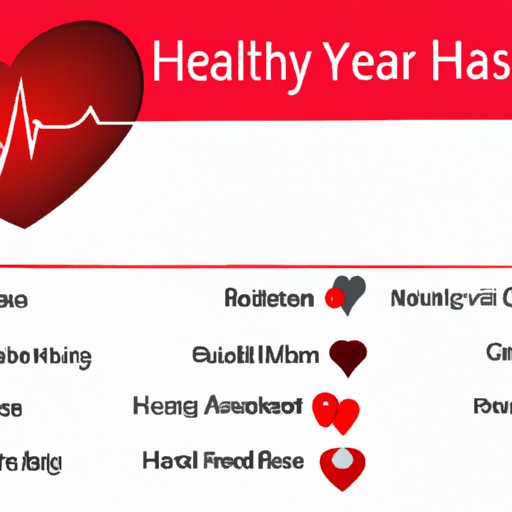Introduction
Heart health is an important topic that affects everyone. Taking care of your heart can help you live a longer, healthier life. Poor heart health can lead to serious medical conditions such as stroke, heart attack, and other cardiovascular diseases. That’s why it’s so important to take steps to keep your heart healthy. In this article, we’ll explore some ways to make your heart healthy, including diet, exercise, monitoring blood pressure and cholesterol, managing stress, and quitting smoking.
Eating a Healthy Diet
Eating a healthy diet is one of the best things you can do for your heart health. According to the American Heart Association, “A healthy diet includes fruits and vegetables, whole grains, low-fat dairy products, skinless poultry and fish, nuts and legumes, and non-tropical vegetable oils.” Eating these types of foods can help reduce your risk of heart disease by lowering your cholesterol and blood pressure levels.
Incorporating these foods into your diet can be easy. Start by adding more fruits and vegetables to your meals. Instead of reaching for a bag of chips, try snacking on carrots, celery, apples, or other fresh fruits and vegetables. Swap out white rice and pasta for whole grain options. Choose lean proteins like skinless chicken, fish, or beans instead of red meat. Finally, opt for healthy fats such as olive oil or avocado instead of butter or margarine.
Exercise Regularly
Regular physical activity is another important part of maintaining a healthy heart. Exercise helps improve your cardiovascular health by strengthening your heart and improving circulation. It also helps lower your risk of heart disease by reducing cholesterol and blood pressure levels. The American Heart Association recommends at least 150 minutes of moderate aerobic activity, or 75 minutes of vigorous aerobic activity, each week.
Finding time to exercise can be challenging, but there are some simple ways to incorporate physical activity into your daily routine. Take the stairs instead of the elevator, walk or bike to work, or go for a short walk during your lunch break. Even something as simple as going for a 10-minute walk after dinner can have a positive effect on your heart health.
Monitor Blood Pressure and Cholesterol
It’s important to regularly monitor your blood pressure and cholesterol levels. High blood pressure and cholesterol levels increase your risk of heart disease. According to the Centers for Disease Control and Prevention (CDC), “High blood pressure is a major risk factor for heart attack and stroke, two leading causes of death in the United States.” The CDC also notes that high cholesterol levels can lead to blockages in the arteries, which can cause heart attack and stroke.
That’s why it’s important to have your blood pressure and cholesterol checked regularly. Talk to your doctor about when and how often you should have these tests done. If your levels are too high, your doctor may recommend lifestyle changes such as eating a healthy diet, exercising regularly, and avoiding smoking.
Manage Stress
Stress can have a negative impact on your heart health. Long-term stress can lead to high blood pressure, which increases your risk of heart disease. That’s why it’s important to find ways to manage your stress. Some stress-reducing activities include yoga, meditation, deep breathing, journaling, and spending time in nature.
You don’t have to set aside hours every day to practice stress-reducing activities. Even small changes can make a big difference. Take five minutes to meditate before bed, go for a 10-minute walk during your lunch break, or spend some time outside in the fresh air. Find what works best for you and commit to making it a part of your daily routine.
Quit Smoking
Smoking is a major risk factor for heart disease. According to the CDC, smoking can damage your heart and blood vessels, leading to an increased risk of stroke, heart attack, and other cardiovascular diseases. Quitting smoking can help reduce your risk of heart disease and improve your overall health.
If you’re ready to quit, there are several steps you can take. First, talk to your doctor about medication or counseling that can help you quit. Then, create a plan to avoid triggers and cravings. Make sure to have plenty of healthy snacks on hand to help you resist the urge to smoke. Finally, enlist the support of your family and friends to help you stay on track.
Conclusion
Taking care of your heart health is essential for living a long, healthy life. Eating a healthy diet, exercising regularly, monitoring your blood pressure and cholesterol levels, managing stress, and quitting smoking can all help you maintain a healthy heart. By taking these simple steps, you can help reduce your risk of heart disease and improve your overall wellbeing.
(Note: Is this article not meeting your expectations? Do you have knowledge or insights to share? Unlock new opportunities and expand your reach by joining our authors team. Click Registration to join us and share your expertise with our readers.)
